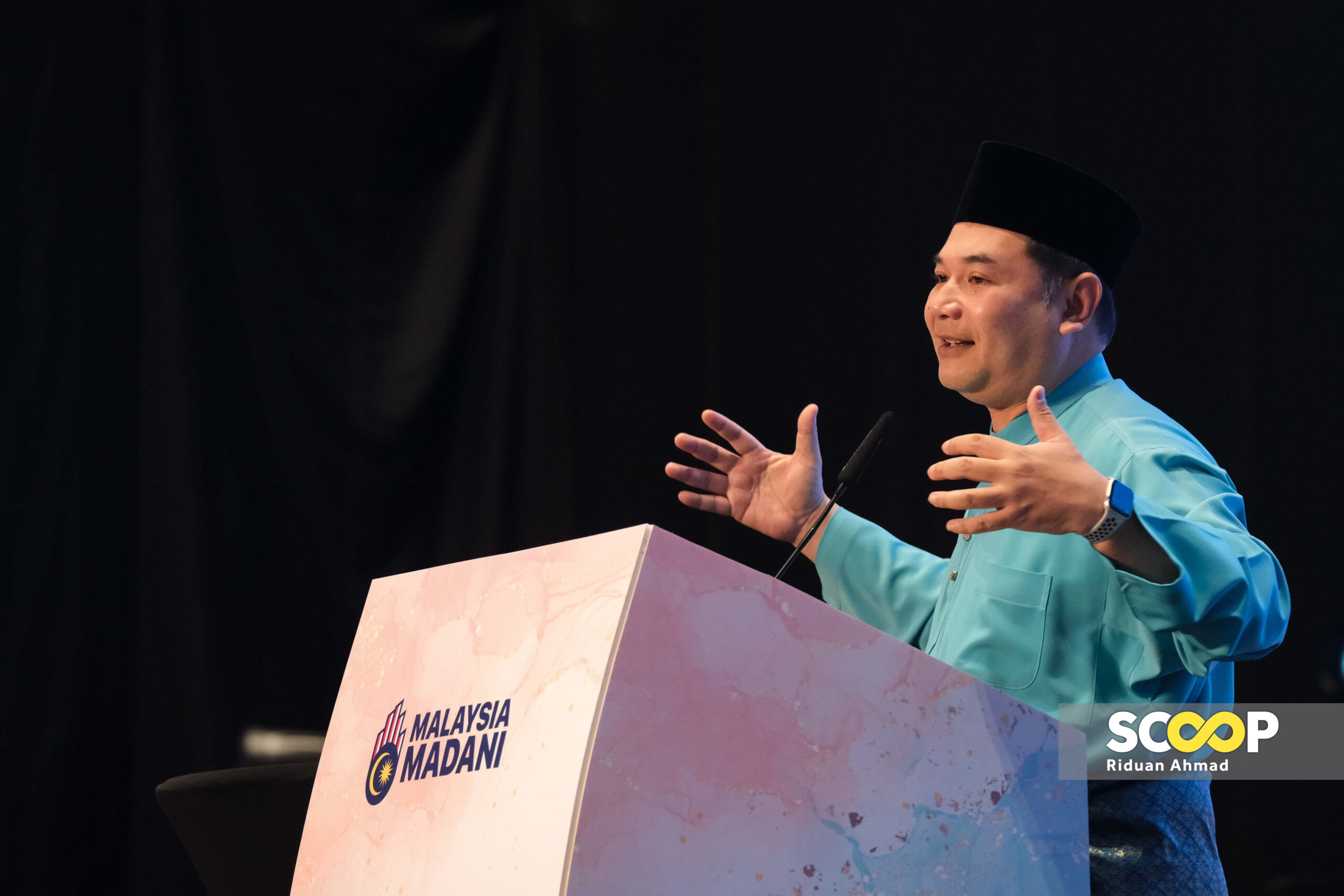

Rafizi’s renewed push for targeted fuel subsidies has sparked criticism from analysts, who say his own record in office showed little political will or delivery on similar reforms. - Scoop file pic, October 1, 2025
NEWS
‘No political will’: Rafizi’s credibility on subsidies questioned by analysts
Former economy minister Datuk Seri Rafizi Ramli’s fresh push for targeted fuel subsidies has drawn scrutiny, with analysts noting that he failed to deliver similar reforms during his time in office

Sandru Narayanan
Updated 7 hours ago
1 October, 2025
8:00 AM MYT
NEWS
‘No political will’: Rafizi’s credibility on subsidies questioned by analysts
Former economy minister Datuk Seri Rafizi Ramli’s fresh push for targeted fuel subsidies has drawn scrutiny, with analysts noting that he failed to deliver similar reforms during his time in office

Sandru Narayanan
Updated 7 hours ago
1 October, 2025
8:00 AM MYT
KUALA LUMPUR – Political analysts have questioned former economy minister Datuk Seri Rafizi Ramli’s credibility over his renewed calls for targeted fuel subsidies, pointing out that he failed to implement the very reforms he now advocates when he was in government.
Their remarks came after Rafizi warned that without targeted subsidies, the country’s top 20% income earners (T20) would continue to enjoy disproportionately higher benefits than the bottom 40% (B40), claiming that for every ringgit spent on RON95 subsidies, T20 households receive 75% more benefit than B40 households.
He also stressed that subsidy retargeting is crucial to protect government finances and ensure fairer distribution.
Speaking to Scoop, Universiti Malaya political analyst Awang Azman Pawi said Rafizi’s current stance has raised questions about his credibility, given his limited success in delivering subsidy reforms during his time in office.
“Rafizi repeatedly stressed the importance of subsidy rationalisation but made little tangible progress, focusing more on rhetoric and the use of ‘big data’ to identify eligible groups,” he said when contacted.
“Technical reasons – such as the need for coordination with other ministries – are insufficient excuses because the Economy Minister holds coordinating authority.
“This has led to the perception that he lacked the political will to deliver on the agenda he championed. Criticising and proposing simple formulas is far easier than putting those ideas into realistic practice.”

Awang Azman Pawi. – UM pic, October 1, 2025
Awang Azman warned that Rafizi’s renewed focus could also undermine public trust.
“People may begin to ask why he is talking about targeted subsidies only after leaving the government. This could damage his credibility and cast doubt on the government’s seriousness in carrying out reforms,” he said.
He noted that subsidy rationalisation remains bogged down by major political and structural obstacles, including populist resistance to price hikes, inconsistent household data, weak inter-agency coordination, and pressure from powerful industry groups.
“Targeted subsidies can be implemented, but the process is highly complex. Without a comprehensive database and proper verification mechanisms, the system risks being seen as unfair — overburdening the M40 while leaving vulnerable groups behind,” he added.
Meanwhile, Dr Azmi Hassan from the Nusantara Academy for Strategic Research said the current Budi95 targeted subsidy system, set to take effect on September 27, was not formulated under Rafizi’s watch, as he had previously handed over the RON95 subsidy rationalisation process to the Finance Ministry.
Azmi said the government’s decision to cap subsidised petrol at 300 litres per month aims to ensure that 99 per cent of users continue to benefit while reducing leakages.
The cap, he added, is flexible and could be lowered — for example, to 140 litres — to cover about 95 per cent of vehicle owners if necessary.
“Criticism alone is not enough. Those who highlight flaws must also propose solutions. Beyond the 300-litre cap, what are the best measures to prevent misuse by those who do not consume their full allocation?” he said.
Azmi also called for clear justifications before granting exemptions to e-hailing drivers, suggesting they should provide proof, such as mileage records, to justify higher fuel usage.
Awang Azman warned that Rafizi’s renewed focus could also undermine public trust.
“People may begin to ask why he is talking about targeted subsidies only after leaving the government. This could damage his credibility and cast doubt on the government’s seriousness in carrying out reforms,” he said.
He noted that subsidy rationalisation remains bogged down by major political and structural obstacles, including populist resistance to price hikes, inconsistent household data, weak inter-agency coordination, and pressure from powerful industry groups.
“Targeted subsidies can be implemented, but the process is highly complex. Without a comprehensive database and proper verification mechanisms, the system risks being seen as unfair — overburdening the M40 while leaving vulnerable groups behind,” he added.
Meanwhile, Dr Azmi Hassan from the Nusantara Academy for Strategic Research said the current Budi95 targeted subsidy system, set to take effect on September 27, was not formulated under Rafizi’s watch, as he had previously handed over the RON95 subsidy rationalisation process to the Finance Ministry.
Azmi said the government’s decision to cap subsidised petrol at 300 litres per month aims to ensure that 99 per cent of users continue to benefit while reducing leakages.
The cap, he added, is flexible and could be lowered — for example, to 140 litres — to cover about 95 per cent of vehicle owners if necessary.
“Criticism alone is not enough. Those who highlight flaws must also propose solutions. Beyond the 300-litre cap, what are the best measures to prevent misuse by those who do not consume their full allocation?” he said.
Azmi also called for clear justifications before granting exemptions to e-hailing drivers, suggesting they should provide proof, such as mileage records, to justify higher fuel usage.

James Chin. – University of Tasmania pic, October 1, 2025
Political analyst James Chin from the University of Tasmania, meanwhile, cautioned that the success of the new subsidy system will depend heavily on Malaysia’s digital infrastructure, especially in rural areas where real-time data transfer remains a challenge.
“Most people understand where the government is coming from and will wait to see if the system works. There will likely be problems in rural regions, but this is a good start, and the system can be improved over time,” Chin said.
He added that previous administrations were often too politically afraid to attempt subsidy reforms, but the current initiative signals a willingness to make bold decisions in the interest of long-term sustainability.
“The renewed debate, triggered by Rafizi’s remarks, underscores the political and structural complexities behind subsidy reform — and raises questions over whether the current government can muster the political will that Rafizi himself did not demonstrate while in office,” Chin added.
It was reported that Rafizi, during his tenure, had handed over responsibility for the RON95 subsidy rationalisation to the Finance Ministry, even though overseeing such reforms also falls within the scope of the Economy Minister.
It is also worth noting that during his tenure as economy minister, Rafizi Ramli failed to deliver on two flagship initiatives that were billed as game-changers for Malaysia’s socioeconomic landscape — the Central Database Hub (PADU) and the Inisiatif Pendapatan Rakyat (IPR).
PADU was envisioned as a comprehensive national database to streamline the distribution of subsidies and welfare aid, ensuring that assistance reached the right households without leakage or duplication. Meanwhile, IPR was introduced as a mechanism to boost the incomes of low-income households by linking them with sustainable economic opportunities, rather than short-term aid.
Both programmes were launched with much fanfare and positioned as critical pillars of the government’s effort to ease the burden of the B40 group.
However, Rafizi’s ministry struggled to move beyond the planning and pilot stages, leaving the initiatives incomplete by the time he left office.— October 1, 2025
Political analyst James Chin from the University of Tasmania, meanwhile, cautioned that the success of the new subsidy system will depend heavily on Malaysia’s digital infrastructure, especially in rural areas where real-time data transfer remains a challenge.
“Most people understand where the government is coming from and will wait to see if the system works. There will likely be problems in rural regions, but this is a good start, and the system can be improved over time,” Chin said.
He added that previous administrations were often too politically afraid to attempt subsidy reforms, but the current initiative signals a willingness to make bold decisions in the interest of long-term sustainability.
“The renewed debate, triggered by Rafizi’s remarks, underscores the political and structural complexities behind subsidy reform — and raises questions over whether the current government can muster the political will that Rafizi himself did not demonstrate while in office,” Chin added.
It was reported that Rafizi, during his tenure, had handed over responsibility for the RON95 subsidy rationalisation to the Finance Ministry, even though overseeing such reforms also falls within the scope of the Economy Minister.
It is also worth noting that during his tenure as economy minister, Rafizi Ramli failed to deliver on two flagship initiatives that were billed as game-changers for Malaysia’s socioeconomic landscape — the Central Database Hub (PADU) and the Inisiatif Pendapatan Rakyat (IPR).
PADU was envisioned as a comprehensive national database to streamline the distribution of subsidies and welfare aid, ensuring that assistance reached the right households without leakage or duplication. Meanwhile, IPR was introduced as a mechanism to boost the incomes of low-income households by linking them with sustainable economic opportunities, rather than short-term aid.
Both programmes were launched with much fanfare and positioned as critical pillars of the government’s effort to ease the burden of the B40 group.
However, Rafizi’s ministry struggled to move beyond the planning and pilot stages, leaving the initiatives incomplete by the time he left office.— October 1, 2025
The Budi95 rollout is actually not a bad process, certainly a huge step forward compared to the previous wide open subsidy system that created a huge underground industry with foreigners (rich Sings!) and commercial/ industrial users abusing the access to subsidised fuel.
ReplyDeleteWith the IT infrastructure in place, it is a less massive step for future more targetted subsidies where eligibility can be controlled to link to IC of those eligible.